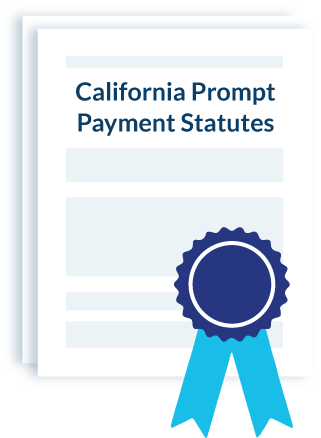
The laws, rules, and regulations surrounding construction payment are complex, indicate, and can have significant consequences if not followed. As well as providing remedies for nonpayment (such as the security provided by mechanics liens) there are specific rules related to the time in which specific payment must be made, what percentage of the contract may be withheld as retainage, and more. The laws change from state to state, project type to project type, and even by the potential claimant’s role in the particular project.
California Prompt Payment Statutes

In general, payment must be made to original contractors within 30 days of invoiceIn general, payment must be made to original contractors within 30 days of invoice, payments from an original contractor to a subcontractor must be made within 7 days after receipt of payment from above (unless otherwise agreed), with final payment not later than 45 days after completion of the project, and payments from a subcontractor to a lower-tiered participant must be made within 7 days of the sub’s receipt of payment. However, these general guidelines may be altered slightly as regards retainage amounts. California retainage law notes that, generally, all retained amounts must be released within 45 days of the “date of completion” of the project. But, in the event of a dispute, the property owner is allowed to continue to retain 150% of the amount in dispute.
Some of the slightly differing wording throughout the different statutes mentioned above relates to this retention of funds in the event of a “dispute”. While some statutes mention “dispute” solely, others mention “good-faith dispute” or “bona fide dispute”. While it is likely inarguable that the California legislature considered a “bad-faith dispute” as a proper reasons for withholding retained amounts, it is difficult to determine whether there is some increased burden associated with showing a “bona fide” or “good-faith” dispute as opposed to an amount that is merely disputed (if these even mean different things int he eyes of the law).
It is important to make a valid determination, however, because the penalties for non-compliance with these statutes can result in significant penalties. Interest penalties of 2% per month (24% per year), can be awarded, along with attorney’s fees, to the prevailing party in an action to recover money owed.
Recent Case and Harsh Penalties
The potentially harsh nature of these penalties was recently demonstrated by a California court of appeals in FTR International, Inc. v. Rio School District. In that case, which was originally filed pursuant to a construction project started in 1999, a dispute over payment of retained amounts led to a significant monetary judgment.
This award, which it should be noted was larger than the original contract itself, was upheld by the appeals court.FTR, a general contractor, entered into a contract in excess of $7 million to build an elementary school. The school district withheld 10% retainage, as allowed by the contract, and at the time of the project’s completion held $676,436.49 in retention. This amount was, for a while, subject to numerous stop notices delivered by FTR’s subcontractors, but by 2004 all the stop notices had been released. Despite the release of the stop notices, the school district refused to pay FTR the retained amount citing a dispute as to certain change orders.
After a decade long legal battle, and a 243 day long trial, the court awarded FTR $9,356,124.81 in damages for the balance due under the contract, extra work performed, delay and disruption caused by the school district, statutory penalties pursuant to section 7107, attorney fees, prejudgment interest and costs. This award, which it should be noted was larger than the original contract itself, was upheld by the appeals court.
Also worth noting, is that of the $9 million dollar award, $1.5 million was solely the interest penalties provided for by the prompt payment statutes. This is a significant penalty.
The moral of the story is this: prompt payment statutes, and retainage rules, are not just fall-back provisions that take a back seat to other nonpayment remedies, they can result in serious and significant awards by themselves.

